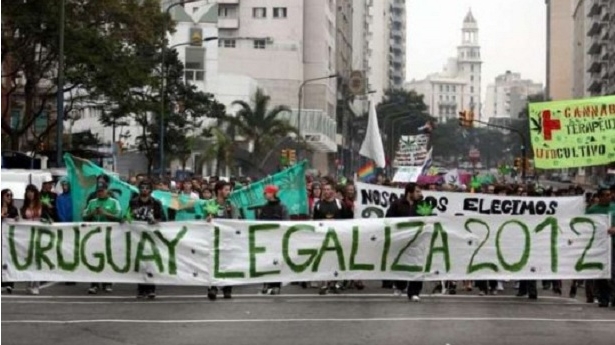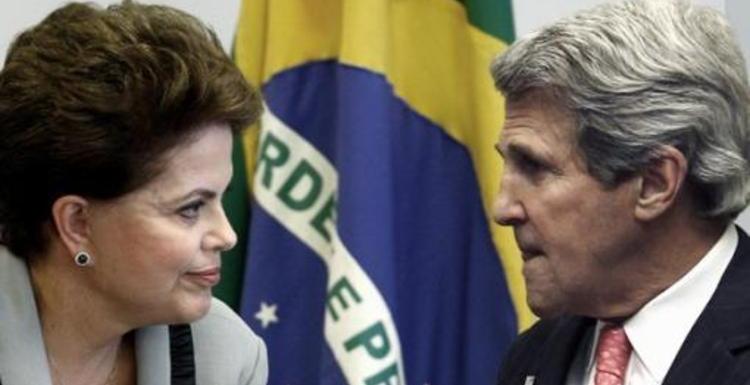Latin America’s Backyard
When Ecuadorian President Rafael Correa indignantly denounced the U.S. spy program and spoke up in defense of whistleblower and leaker Edward J. Snowden, the United States Senate took up the issue, fearing that Correa’s next move would be to grant Snowden asylum. Senator Charles Schumer (D—N.Y.) wanted Ecuador to be punished preemptively, pressing his colleagues in Congress to eliminate the $23 million USD in trade preferences that Ecuador enjoyed under the Andean Trade Promotion and Drug Eradication Act.
This sort of U.S. intimidation used to work on smaller Latin American nations like Ecuador. But Quito was insouciant about the threat, responding by simply canceling Ecuador’s participation in the U.S. tariff reduction program. Furthermore, Correa saw this as an opportunity to mock the United States, offering $23 million USD to the United States for “human rights training.”
United States Secretary of State John Kerry visited Bogotá, Colombia earlier this month, meeting with President Juan Manuel Santos Calderón, as well as the foreign minister and the defense minister. Kerry moved on to Brasília, Brazil the next day for meetings with President Dilma Rousseff and Foreign Minister Antonio de Aguiar Patriota. It was Kerry’s first visit to Latin America as Secretary of State, and a most disappointing debut.
Kerry spent most of his energy in an unpersuasive effort to defend the Obama administration over embarrassing revelations of mass U.S. eavesdropping on Latin American nationals, promising a fuller explanation at some unspecified later date. Kerry, who in fact developed a reputation as a senator attuned to the sensitivities of Latin America, labored to shore up sagging U.S. influence in the region. He dutifully rehearsed the conventional U.S. agenda for the region: more neoliberal economic policies, support for the U.S.-led war on illegal drugs, and cooperation in stemming the flow of unauthorized immigration.
The crux of the issue is that the principal U.S. policy goals toward Latin America are innately bad for the welfare of the region. Free market economic policies in Latin America have a proven record of producing inequality and tepid GDP growth, and the focus on raw material exploitation is unsustainable environmentally and cannot carry along with it authentic long-term economic development. The U.S.-led war on illegal drugs is a failure of truly monumental proportions, now even rejected by increasing numbers of U.S. voters. And finally, halting the flow of immigrant workers—a goal motivated at best by nativism and at worst by old-fashioned racism—is at once unrealistic and economically unsound.
Of course, this critique of the U.S. policy agenda for Latin America is about as old as the policies themselves. Such criticism has been a common refrain for decades in Latin America and among the American progressives, including the Council on Hemispheric Affairs, who share the view that probably the best course of action would be for the United States to just leave Latin America alone. In fact, this sentiment seems to have existed for centuries, as even Simón Bolivar observed in 1829 that “the United States seem destined by Providence to plague [Latin] America with misery in the name of freedom.” [1]
But two-thirds of the hemisphere is now governed by the left or center-left, and they have moved on from this antiquated debate. Today, they do not much care what the United States proffers as in its best interest; they feel much more freedom to ignore U.S. threats small and large, unimpressed by the once great American power.
At a July 30 meeting of Latin American states, Ecuadorian President Correa referred to the Organization of American States—once the sole inter-American association—as “a U.S. ministry for the colonies.” [2] In place of the OAS, Latin America is forging new groups that explicitly exclude the U.S. (and Canada) from participation. These include the 2004 Alianza Bolivariana para los Pueblos de Nuestra América (Bolivarian Alliance for the Peoples of Our Americas, ALBA), which is decidedly anti-neoliberal in its goals, as well as the Unión de Naciones Suramericanas (Union of South American Nations, UNASUR), founded in 2008. Also newly formed is the Comunidad de Estados Latinoamericanos y Caribeños (Community of Latin American and Caribbean States, CELAC), which was founded in 2011. UNASUR and CELAC both provide forums for South American and now all Latin American and Caribbean nations to come together and craft collective positions without any interference or even input from the United States or Canada.
Across Latin America, many leaders are arriving at the view that the region has very little to learn from the United States. Indeed, the situation has begun to reverse. Today, it is the United States that could truly benefit from paying attention to what its Latin American neighbors are beginning to achieve.
The United States has the largest prison population in the world, with 2.2 million individuals incarcerated, more than half for non-violent drug offenses. [3] The U.S. imprisons 730 of every 100,000 of its people, easily the highest rate in the world. It is abundantly clear that reforms in this sector are long overdue.
What the Latin American nations get but the United States policymakers cannot seem to understand is that treating drug addiction as a criminal matter is needlessly cruel and financially ruinous. What drug addicts deserve is not prison, but sympathy. Understanding this, Ecuador’s 2008 constitution mandated that drug use no longer be treated as a crime, but simply as a public health concern. Meanwhile, last year U.S. voters in the states of Washington and Colorado approved recreational marijuana consumption; but internationally, the U.S. crusade against illegal drugs continues full blast.

Uruguay is developing an alternative approach, leading the way on this issue, moving forward this month on the adoption of policies that would legalize marijuana and make it available for purchase at local pharmacies. It seems that Latin America is coming to realize the lack of sense in the U.S. anti-drug fixation, and will not be taking part in the crusade much longer. It is time for the United States to give up on such clearly counter-productive policies, both at home and abroad. For ideas, it would be wise to study how Uruguayans are working through the transition to more enlightened and practical drug policies.
The United States is facing a crisis in higher education, with some 37 million Americans carrying the burden of unpaid student loans with a combined total of $1 trillion USD. [4] Meanwhile, in Chile, presidential candidate (and former president) Verónica Michelle Bachelet Jeria has developed a bold proposal for dealing with rising student debt, promising that if elected in November 2013 she would move to guarantee free public education through the university level for all Chileans.
In the United States, the average credit card interchange rate (handling fee) for merchants is about 2.3 percent (as of 2011). [5] There is no real justification for such usurious charges; U.S. firms have discovered they can get away with them if they all do it, and so they do. But not in Latin America. In Argentina, the government of President Christina Fernández de Kirchner is introducing a “Supercard,” which will offer a reasonable 1 percent handling fee. [6] Likewise, in Ecuador, President Correa’s government implemented reforms that restored some sanity to the out of control credit card fees. Correa is also going after ATM fee gouging. [7]
The U.S. political system is stuck in a hopeless stalemate, as the U.S. Congress seems to be incapable of moving forward on any issue at all. Not long ago, such dysfunctional political systems could be found in Venezuela, Bolivia, and Ecuador. None of these nations seemed capable of addressing the desperate concerns of ordinary people, and the chronic government inaction led to deep cynicism and profound popular disgust with all politicians. But beginning in 1998 with the election of Hugo Chávez, Venezuela rewrote its constitution, breaking its decade-long political impasse. In 2008, Ecuador took the same path, followed by Bolivia in 2009, as both nations staged elections for constituent assemblies, rewrote their constitutions, and conducted plebiscites in which the documents were resoundingly approved by overwhelming majorities. A steady stream of progressive reforms has followed in all three nations. Latin America has demonstrated that there is a viable pathway out of political gridlock.
If the existing institutions do not serve human needs, people will invent new ones. This is what people have accomplished in Venezuela, Ecuador, and Bolivia, and what citizens should not be afraid to work toward in the United States. The United States is so close to Latin America—really just in its backyard. It is time for the United States to look to its southern neighbors for example and inspiration.
Dr. Ronn Pineo, Senior Research Fellow at the Council on Hemispheric Affairs and Chair of the Department of History at Towson University, and Dr. Larry Birns, Director of the Council on Hemispheric Affairs.
Please accept this article as a free contribution from COHA, but if re-posting, please afford authorial and institutional attribution. Exclusive rights can be negotiated.
For additional news and analysis on Latin America, please go to:LatinNews.com and Rights Action
References
[1] John Lynch, “Simón Bolivar: A Life,” Yale University Press, 2007, p. 264.
[2] Latin American Weekly Report, 8 August, 2013, 3.
[3]Natasha Lennard, “U.S. has more prisoners, prisons than any other country,” Salon, 15 October, 2012, http://www.salon.com/2012/10/15/us_has_more_prisoners_prisons_than_any_other_country/
“Entire world – Prison Population Rates per 100,000 of the national population,” International Center for Prison Studies, http://www.prisonstudies.org/info/worldbrief/wpb_stats.php?area=all&category=wb_poprate.
[4] “Student Loan Debt Statistics,” American Student Assistance, http://www.asa.org/policy/resources/stats/.
[5] Tim Chen, “Credit-card swipe fees: US firms pay too much – and it hurts consumers,” The Christian Science Monitor, 13 April, 2011, http://www.csmonitor.com/Business/new-economy/2011/0413/Credit-card-swipe-fees-US-firms-pay-too-much-and-it-hurts-consumers.
[6] Latin American Weekly Report, 8 August, 2013, 12.
[7] “Ecuador’s Correa pushing for higher bank taxes as election nears,” Reuters, 26 October 2012, http://www.reuters.com/article/2012/10/26/ecuador-election-banks-idUSL1E8LNH6720121026.


